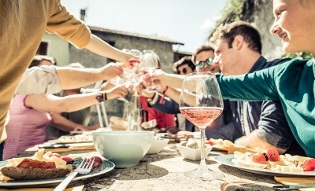
Fashion for a slim and fit figure does its job - we all follow diets from time to time.
But a few holidays can ruin your efforts, and the reason is alcohol consumption.
How alcohol affects weight loss
The main negative effect is dehydration. In this case, the cells not only lose water, but also the necessary minerals and trace elements, which play an important role in metabolism and thus in weight loss or weight gain.
Under the influence of alcohol, a person easily breaks prohibitions, eats much more than intended, and satisfies the dishes. As a product, alcohol has no nutritional value, our body will primarily consume calories from it, but the rest that is obtained with it is put aside.
Alcohol has been shown to lower testosterone levels and impair digestion, which also leads to weight gain in return for the desired weight loss.
What kind of alcohol doesn’t affect the diet much
Obviously, sweet alcohol is very high in calories and should not be put on a diet. Ethyl alcohol itself has 710 kcal per 100 grams, which means that all spirits are high in calories too.
Foods excluded from the diet include all sweet, semi-sweet and fortified wines, champagnes, liqueurs and cahors. It is better not to consume beer at all during weight loss: despite its low nutritional value, it contains phytoestrogens, slows down metabolism and promotes the growth of adipose tissue in the body.
It is permissible to drink one or two glasses of dry wine with a volume of approximately 150-200 ml. The wine can be red or white, depending on your preferences, with a strength of 7-11%.
What you eat alcohol while on a diet
If you are watching your weight, choose for snacks:
- low-fat cheese;
- baked or boiled chicken, turkey, beef, veal;
- baked, steamed or boiled vegetables;
- fish (except fried and smoked);
- lemon.
To reduce the overall harm from alcohol exposure, the most important thing is not to abuse it and not to drink too much. Try to avoid strong and sugary alcoholic drinks.
When attending a festival, eat foods that contain protein.


























